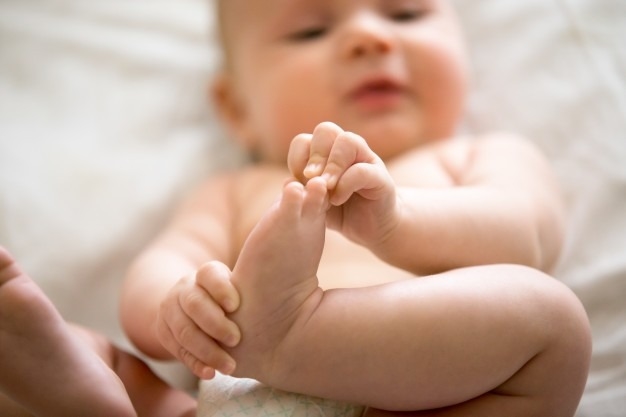
First Year Baby Milestones: Grasping Skills
24 May 2018 | 4 min Read
Pallavi Gupta
Author | 3 Articles
Did you know that soon after birth your baby can curl his/her fingers around yours? This is nothing else but the grasp reflex, which babies forget and then relearn during their developmental phase. Your baby’s grasp reflex improves as his/her eyesight improves and his curiosity to explore the world increases. Baby grasping is an important milestone because advanced skills and fine movements are dependent on his/her grasp skills.
What is the meaning of your baby’s grasp reflex?
To grasp means to hold. The grasp reflex is the ability of your baby to hold tightly on to objects that touch his/her palm. This is an involuntary action and the grip of your baby is relatively strong (strength of the grip is unpredictable and varies). Sometimes, this grip is so strong that if you lift your hand up, your baby can be lifted along with it too!
By what age will my baby develop the grasp reflex?
Immediately after birth, your baby starts holding things, but by 6-8 weeks s/he unlearns it. Once again this hand grasp reflex starts developing from the 4th month. By 6 months of age, s/he is able to transfer objects from one hand to the other, thus improving his/her grip over objects. By the 9th month, your baby will be able to hold on to the object or is able to pick up the objects with his/her thumb and index finger, in what is known as the pincer grasp.
What is the importance of grasp reflex?
Baby grasping is a crucial milestone and is a predictor of his/her gross and fine motor skills. This is the foundation on which your baby will learn holding a pen, writing, drawing, coloring etc.
What can I do to help my baby to tune his/her fine motor skills?
Here is a list of activities that can help you in developing the baby’s grip reflex
- Take a small colorful object that can fit in your baby’s hands. Allow him/her to feel it and then place it in front within reach; this will stimulate and make him/her to try to hold the toy.
- After this, you can use similar such toys and allow your baby to feel it; then just move this toy around his/her face (right side, left side and place it in front). This will encourage your baby to move his/her hand in the direction of the toy and once s/he reaches out to the toy, allow him/her to play with the toy.
- Keep your baby in the sitting posture and surround him/her with various small colorful toys; this will stimulate your baby to reach out to his/her toys and grasp them.
These are simple but effective activities that help in stimulating your baby’s grasp reflex; once he develops this, you can stimulate his pincer grip.
Here are some pincer grasp activities for babies:
- Playing with soft blocks
- Baby finger foods
- Reading a story book and allowing him/her to turn the pages
- Coloring a book
If my baby is not able to grab things, is it a matter of concern?
By 6-8 months of age, babies learn to pick up things and transfer toys from one hand to another, yet some babies may take 9 months to pick up toys from the floor. But, if there is further delay, you must consult your pediatrician.
Here are signs related to the baby grab reflex that you must be concerned with:
- Your baby is not trying to reach attractive colorful objects or toys in spite of being older than 3 months
- Your baby is not reaching for objects by 4 months of age
- Your baby is not able to pick up toys by 10 months of age
Sometimes, babies take extra time to develop pincer grasp, so you need not worry about it. Avoid comparing your baby with other babies constantly, as each baby is unique and takes her/his own time to acheive milestones.
Also read: Spatial Awareness: An Essential Life Skill
Explore the entire collection of articles: Baby Growth And Development
A


Related Topics for you
Suggestions offered by doctors on BabyChakra are of advisory nature i.e., for educational and informational purposes only. Content posted on, created for, or compiled by BabyChakra is not intended or designed to replace your doctor's independent judgment about any symptom, condition, or the appropriateness or risks of a procedure or treatment for a given person.
